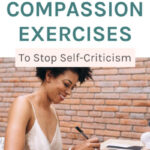15 Simple Self-Compassion Exercises To Try
As children, we’re taught about showing kindness to others, being supportive and showing up for the people who matter most.
However, the message we didn’t hear was that this applies to ourselves too. Yes, being kind, supportive and showing up for ourselves!
That’s what we’re talking about today in the form of self-compassion exercises.

Today I’m sharing some powerful exercises you can use in times of need.
Do not underestimate the power of these self-compassion examples. Many of these are small things you can do that have a big impact over time.
After all, as Jack Kornfield said…
“If your compassion does not include yourself it is incomplete.”
So, let’s get into what it means to be self-compassionate.
What is The Meaning Of Self-Compassion?
To understand self-compassion you first need to know the meaning of compassion, which is to have “a sympathetic pity and concern for the sufferings or misfortunes of others.” (New Oxford Dictionary).
Therefore, self-compassion is turning that concern for suffering inwards to yourself.
Dr. Kristin Neff, the leading researcher of self-compassion reminds us that…
“Instead of mercilessly judging and criticizing yourself for various inadequacies or shortcomings, self-compassion means you are kind and understanding when confronted with personal failings.”
Dr. Kristin Neff
We all make mistakes and this is completely normal. So, we shouldn’t be beating ourselves up for something that is part of the human experience.
Self-Compassion means:
- Kindness
- Mercy
- Sympathy
- Empathy
- Tenderness
- Humanity
The best way to think about self-compassion is to use these words as your guide on how to treat yourself in times of need.
–
This post contains affiliate links, meaning I may earn a small commission if you make a purchase through my links, at no extra cost to you. Read disclosure info here.
What are the 3 components of self-compassion?

Dr. Kristen Neff breaks self-compassion down into three key elements.
1. Self-Kindness vs. Self-Judgement
In essence, this is focusing on being kind to yourself, especially if you notice you’re slipping into harmful negative self-talk.
2. Common Humanity vs. Isolation
When things don’t go our way and many people can feel isolated assuming they’re the only ones going through this specific tough experience.
Being self-compassionate means understanding that all humanity experiences suffering. It is not on you alone.
3. Mindfulness vs. Over-Identification
“Mindfulness is a non-judgmental, receptive mind state in which one observes thoughts and feelings as they are, without trying to suppress or deny them.” – Dr. Kristin Neff
So, if you find negative thoughts and emotions creeping in – take note of them, be aware of them, but also take them for what they are. This means being aware and moving on, by not ruminating over negative thoughts.
Note: the above elements of self-compassion are based on the research and learnings of Dr. Kristin Neff.
Dr. Kristin Neff is a leader and pioneer in the field of self-compassion research. She is known for sharing self-compassion exercises, which I’ll share more info on below.
In addition, she has published a number of books on self-compassion, including…
If you’re interested in learning more about her work, check out her self-compassion exercises. Many are on audio and can be completed in as little as 5 minutes.
15 Self-Compassion Exercises You Can Try, Starting Today

As you’re reading through these self-compassion exercises, think about what you need the most right now, in your current situation.
And then, simply start.
Just one small step to showing compassion to the person who matters most – you.
1. Be Aware Of Negative Self-Talk
Negative self-talk can be extremely harmful to our overall happiness and well-being. Therefore, this first self-compassion exercise is designed to create awareness of the critical self-talk you are regularly engaging in.
Think about the following:
- Do you have any regular negative emotions towards yourself?
- What is your inner critic saying?
- Do you find yourself repeating the same things over and over again?
Now, take note of any negative self-talk you have. Go ahead and write this down, which will set you up for the next exercise.
2. Reframe Your Thoughts
This is a self-compassion exercise I’ve been doing for a number of years.
Get out your notebook (or check out day 11 of my self-love journal).
- Write a negative belief you have about yourself.
- Then write the opposite of that belief (an alternative belief).
- Now ask yourself: How would you feel and behave if you believed this positive, alternative belief?
Let me share an example:
Negative belief: People don’t like me
Alternative positive belief: I am liked
Some people may not like me, and that’s okay. I will focus on those who do like, love and care about me – and I’ll start with myself.
When I am liked I feel happy and I want to engage with others.
3. Treat Yourself As A Close Friend

Think about it… how would you treat a best friend during hard times?
Would you use kind words or be critical?
Being a good friend is about:
- Providing support, in good times and bad
- Giving encouragement
- Being a good listener
- Having fun
- Showing up when they need you
Self-Compassion Exercise:
- Write down the qualities that you think a friend should provide
- Then write down examples of things you can do for yourself that relate to each quality
4. Compassion-Focused Therapy
There are many types of therapy out there and yes, there is even one focused on self-compassion.
According to GoodTherapy, Compassion-focused therapy (CFT) aims to help promote mental and emotional healing by encouraging people in treatment to be compassionate toward themselves and other people.
Many therapists and social workers will provide this type of therapy, so look in your area for a good therapist and ask if they can work with you on this.
5. Dedicate Time To Acts of Self-Kindness
What acts of kindness can you do for yourself every day?
It is extremely commendable to do good deeds and perform acts of kindness for others – always. If you already do this you are a beautiful person.
But hold on and ask yourself…
When was the last time you performed an act of kindness for yourself?
Here are some examples of acts of kindness I use for myself:
- Giving myself permission to say no – and following through on that ‘no’
- Focusing on what I’ve learned, even when my results didn’t turn out the way I expected
- Dedicating time to do the things I love
- Giving myself breaks when I need them
- Treating myself to little things that bring me joy – flowers, a new tea cup, or a new book
6. Write A Letter To Yourself
Writing self-compassionate letters to yourself when you are going through a difficult time might be just what you need to get back on track.
Think about what you need to hear, the type of support you need and write it down.
Address the letter to yourself and show kindness and understanding with your words.
7. Practice Living In The Present Moment
Living in the present moment means focusing on the now – not your past problems or future worries now where you are in this moment.
The benefit of being in the moment means you’re reducing stress, and experiencing gratitude.
This means, putting your phone away and experiencing what’s right in front of you.
It might be a book, your kid’s baseball game or a conversation with your partner. Go all in as these are the things that matter.
8. Try Self-Love Writing Exercises
Using journal prompts is a great way to practice self-love and self-compassion. Here are some examples of writing prompts you can use…
- Think about a challenge you faced and how you became stronger because of it
- What do you wish others would say to you? List at least 5 things. (Now, say them to yourself instead)
- How can you love yourself more today? List 3 feel-good activities.
Access more self-love journal prompts here, or check out the full journal you can pick up on Amazon.
9. Compassionate Body Scan Meditation
This self-compassion exercise is a 20-minute meditation that uses a body scan method to practice self-compassion. This focuses on bringing your attention and awareness to different parts of the body.
While doing this Dr. Neff recommends showing compassion for any shame, pain or feelings of inadequacy.
Check out the video below…
10. Take A Mental Break
Similar to self-care, a mental break is doing things to help you unwind and recharge. This mental break could be used daily for 30 minutes to an hour, or you could take a longer mental break.
A mental break could consist of:
- Going for a gratitude walk
- Having a nap
- Reading a good book
- Drinking tea
- Spending time in nature
- Doing yoga
- Practicing deep breaths
The key is to do something that releases tension and helps you clear your mind.
11. Practice Compassion For Others
When you dedicate time to practicing compassion for others, you are also training yourself to do the same for yourself.
When you make it a habit to practice empathy and compassion every day it becomes second nature to automatically be compassionate to yourself.
After all, we spend more time with ourselves and more time with our minds that anyone else. We deserve to use this time wisely and kindly.
12. Have a Self-Compassion Break
Take a quick self-compassion break with this self-compassion exercise by Chris Germer, clinical psychologist and co-creator of the Mindful Self-Compassion program.
13. Positive Affirmations
Affirmations are positive statements we make about ourselves to provide support. They can be used to motivate us and to get us through stressful, tough situations.
The great thing about affirmations is they can be used for so many areas of your life including practicing self-compassion.
Here are some examples of self-compassion affirmations:
- I accept myself for who I am today.
- I am proud of myself for getting through tough times.
- I am worthy of everything this world has to offer.
- I know this difficult time will pass, and I’ll be stronger because of it.
- I love myself today and always.
- I am proud of what I stand for.
- I will show kindness to myself today.
- It is natural and expected to be imperfect. These imperfections make us unique and special.
- My feelings are relevant and deserve support and kindness
Related: 110 Self-Compassion Affirmations To Practice Kindness
14. Mindmap Self-Compassion
I recently read The Last Diet by Sharoo Izadi, which focuses purely on the mindset of losing weight.
If it sounds interesting, I highly recommend it. It’s like a full therapy session in book format and has changed the way I feel about my body and my weight loss goals.
Anyway, Sharoo has numerous mind map exercises in the book – basically one at the end of each chapter.
My favourite mindmap is from a chapter called ‘Cheerleading: Becoming your own motivational coach’.
In this exercise think of someone you deeply care about and who you really believe in.
- Write their name in the middle of a piece of paper and draw a circle around it.
- Imagine this person approaching you and saying they are struggling with weight loss. They are extremely frustrated and upset that it seems too hard and they don’t deserve to lose weight anyway.
- What would you say to them? Write down everything you’d say around their name
- Now, erase their name and add your own name there. This is how to can motivate and speak kindly to yourself.
Note: Weight loss is being used as an example here, in reference to the book – however you can use this mind map for any area you’re currently struggling with…
- Finding a job
- Having relationship strugglings
- Being financially insecure
- Addiction
- Getting pregnant
- Etc
15. Give Yourself Daily Praise
Every day write down something you’re proud of doing. It’s that simple.
- You showed yourself love – write it done
- You achieved a goal – write it down
- You used positive self-talk instead of negative – write it down
- You felt confident and beautiful – write it down
This practice can turn into a self-compassion journal that celebrates your wins.
The best part is you can read your growing list whenever you need a bit of support.
What Self-Compassion Exercises Are You Going To Try?
Share in the comments below. Or tell us, is there another way you like to practice self-compassion?
Related Resources To Help You Practice Self-Compassion:
- 57 Self-Compassion Quotes To Show Yourself Kindness
- 40 Self-Love Reminders To Improve Your Day
- What Are Boundaries & Why Do They Matter?
- 10 Strategies To Overcome Self-Criticism
- Encouraging Words For A Friend Going Through A Tough Time
- How To Start Loving Yourself Again: 20 Self-Love Ideas

About Yolanda
Website Owner / Content Creator
I’m passionate about helping you live life to the fullest so you can choose to find happiness and purpose. Learn how to CREATE THE LIFE YOU LOVE with intentional living and discovery of the simple things life has to offer. Learn more…







